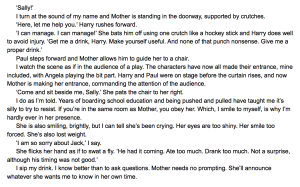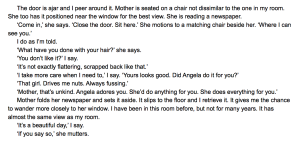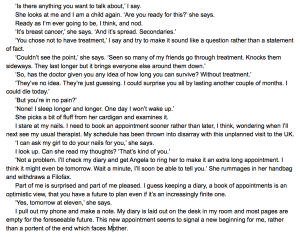RedPen Editing
Opening remarks
The words that come out of a character’s mouth are down to the writer. That’s you!
Me? In my defence, I refer to myself as the typist, not the writer of my novel. My characters talk to each other, think about each other, rattle on, and I just transcribe. They talk through me, at me and sometimes behind my back. Lucky I can type fast?
If the characters are fixed enough in my mind, they talk with easily differentiated voices, literally, so I don’t worry much during editing, over and above adding punctuation marks. Here’s an example –
 While I’m inserting the opening and closing quotes, and generally fixing typos on the way past, I’m conscious that this is the first time the reader meets Mother ‘in the flesh’. Mother is mentioned in the opening scene of this Safari Supper novel, but only with respect to the death of Jack, her husband, when Sally receives this news by telephone. Later, on the day Sally returns to the UK in time for the funeral, her Mother is once more at arms’ length, ‘resting’ according to cousin Harry. So, the reader has time and opportunity to meet other characters first – Harry’s sister, Angela, and Harry’s father, Paul – and to become aware of how they each refer to Mother, before she makes her grand entrance.
While I’m inserting the opening and closing quotes, and generally fixing typos on the way past, I’m conscious that this is the first time the reader meets Mother ‘in the flesh’. Mother is mentioned in the opening scene of this Safari Supper novel, but only with respect to the death of Jack, her husband, when Sally receives this news by telephone. Later, on the day Sally returns to the UK in time for the funeral, her Mother is once more at arms’ length, ‘resting’ according to cousin Harry. So, the reader has time and opportunity to meet other characters first – Harry’s sister, Angela, and Harry’s father, Paul – and to become aware of how they each refer to Mother, before she makes her grand entrance.
Mother’s behaviour and conversation in this opening scene paints her as a tricky individual: impatient, bossy and in command.
A subsequent scene includes the first private conversation between Sally and her Mother. Sally has arrived, by appointment, for an ‘audience’ with her Mother.
 The relationship between Sally and her Mother is thus developed, with Mother being grumpy and Sally trying to remain upbeat. Later in the same scene, Sally broaches the topic of her Mother’s terminal illness.
The relationship between Sally and her Mother is thus developed, with Mother being grumpy and Sally trying to remain upbeat. Later in the same scene, Sally broaches the topic of her Mother’s terminal illness.

By the end of any conversation, the reader should know both characters a bit better, their approach to life – and death – and their relationship, parts of which will never change and parts which have to change due to circumstances.
It’s important to unveil a character, like peeling the skin off an onion, one layer at a time. When you meet someone for the first time, you don’t get the full CV, just first impressions. It’s only in later exchanges that a character begins to show their hand, and maybe you begin to understand them?
Of course, the next time you meet someone, they may have changed their position. Fate may be dealt some blow and they’ve altered their perspective. Ditto for you.
Also, people in real life behave differently according to the company they keep. What Mother says to the crowd may be for effect; what she says to Sally without witnesses may be more telling of their relationship and Mother’s needs.
Conversation is like a cocktail. Interesting blend of ingredients but never the same two times running?

